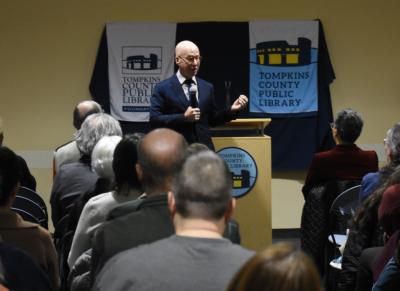
MLK Biographer, Pulitzer Prize Winner Delivers Message of Hope, Resilience in Face of Current Challenges While Speaking on Dr. King at Tompkins County Public Library
In front of a capacity crowd at Tompkins County Public Library, Pulitzer Prize-winning author Jonathan Eig pointed to lessons from the life of Dr. Martin Luther King, Jr. as evidence that everyday citizens can make a difference.
Speaking on his biography of Dr. King that won the 2024 Pulitzer Prize in the category, Eig told the crowd of key moments in King’s life from the day the then 26-year-old minister had a panic attack when he was about to speak about the Montgomery Bus Boycott in 1955, to Dr. King’s final moments in Memphis in April 1968.
Eig said it was only after he sent “King: A Life” to the publisher that he realized the importance of King’s final words. “OK, I will.”
Dr. King was answering his driver, who said the minister should get a coat because it was cold. Eig said he came to realize the power of those words for Dr. King’s place in the Civil Rights movement, and as “our greatest American, period,” as Eig described Dr. King.
“It hit me hard,” Eig said. “This was the same person who just 12 and a half years earlier when asked to speak at the beginning of the Montgomery Bus Boycott had to think about it, before he said, ‘OK, I will.’ And he had to say it over and over again. After being arrested 29 times. After being stabbed in the chest. Having to say it over and over again. ‘OK, I will.’”
Eig equated many of the challenges Dr. King faced 60 years ago to the issues of today.
“We all go through struggles. Sometimes, and in particular today, it feels these are hopeless battles. It feels like even the things King fought for and secured are being stripped away. Voting rights are under attack. Civil rights are under attack. Black history is under attack.”
Eig continued, “The thing King would say that he said over and over again, is ‘Never lose hope, no matter how desperate things may seem.’”
Eig’s approximately 45-minute-long book talk included anecdotes about the people he spoke to while writing “King: A Life.” Among them, a white man who was afraid to tell his coworkers he was married to a Black woman, until after Dr. King’s famed “I Have a Dream” speech at the March on Washington in August 1963. Eig said the next day, that man put a picture of his wife on his desk. Eig spoke of the white National Park Service Ranger, who adjusted Dr. King’s microphone during that speech, and how the power of Dr. King’s message helped the Ranger overcome his own racism.
Eig’s speech, and indeed his book, didn’t just focus on Dr. King’s legendary exploits. During the Q&A session with the audience, Eig also spoke of Dr. King’s relationship with civil rights icon Dorothy Cotton, who many called the “Second Mrs. King.” Eig spoke of how he wished he had been able to ask her about her intimate relationship with Dr. King before her death in Ithaca in 2018.
Eig also spoke on the FBI records, which “King: A Life” was the first biography of Dr. King to cover in depth.
“The day after the March on Washington…Assistant Director William C. Sullivan of the FBI wrote a memo to his boss, J. Edgar Hoover saying that ‘given King’s powerful speech we must now rate him as the most dangerous man in America when it comes to race.’”
Eig also detailed the FBI’s threats to Dr. King, which included giving him a certain day by which they expected him to die by suicide.
Eig told the audience of the emotions that overcame him when he heard the voice of Dr. King’s wife, Coretta Scott King on audio recordings, and of the struggles of going through the FBI files at the same time as the nation was dealing with the summer of unrest that followed the murder of George Floyd in Minnesota in May 2020.
Eig also described Dr. King as conflict adverse, struggling to say no. “Think about that the next time you feel like there’s a challenge and it’s just not ideal,” Eig told the audience.
Elaine Westbrook, Cornell University’s Karl A. Kroch University Librarian, in her introduction of Eig, lauded how “King: A Life” reminded readers that Dr. King was “one of the most brutally divisive figures in our country. Yet, ‘[to quote “King: A Life”] in the process of canonizing King, we defanged him.’”
TCPL Director Leslie Tabor thanked Eig for speaking at the Library, which she called, “A bastion of democracy,” and a critical tool in helping avoid repeating the same mistakes made in the past.
Among those in attendance at the event was Martha Brewster, whose husband, Rev. John Gurdon Brewster, finished his seminary internship with Dr. King at Ebenezer Baptist Church in Atlanta. Mr. Brewster was the sculptor who created “Prophetic Thunder,” the striking tribute to Dr. King located in TCPL’s North Reading Room. Following the event, Eig called the sculpture “The coolest MLK statue I have seen.” Mrs. Brewster also gifted Eig a copy of her late husband’s memoir “No Turning Back” detailing his time with the King family.
Eig’s appearance at TCPL was made possible with the help of donations to the Tompkins County Public Library Foundation. Odyssey Books of Ithaca, which oversaw the book signing, will be donating 15% of proceeds from book sales at the event to The Greater Ithaca Activities Center in partial support of its library.